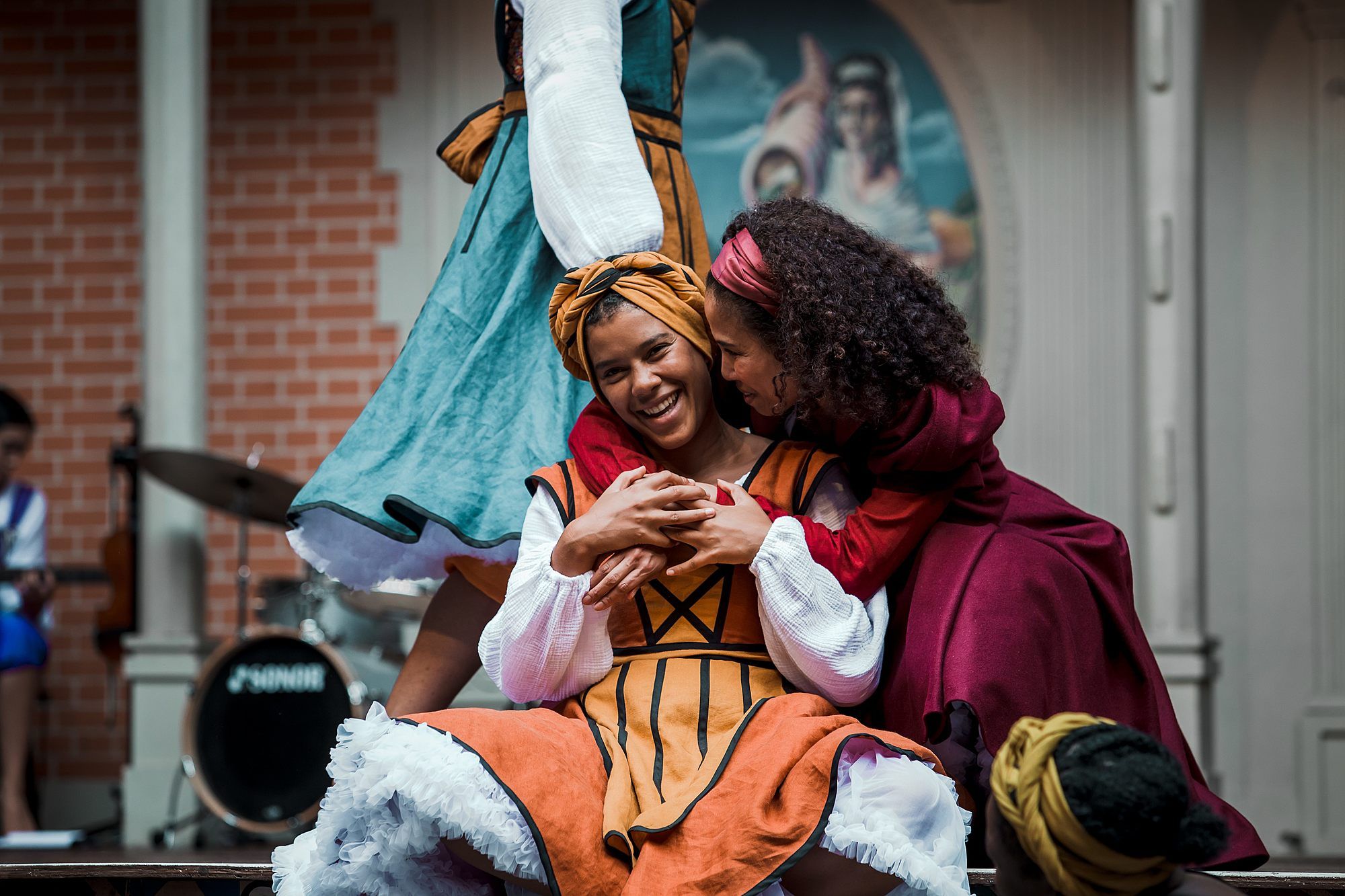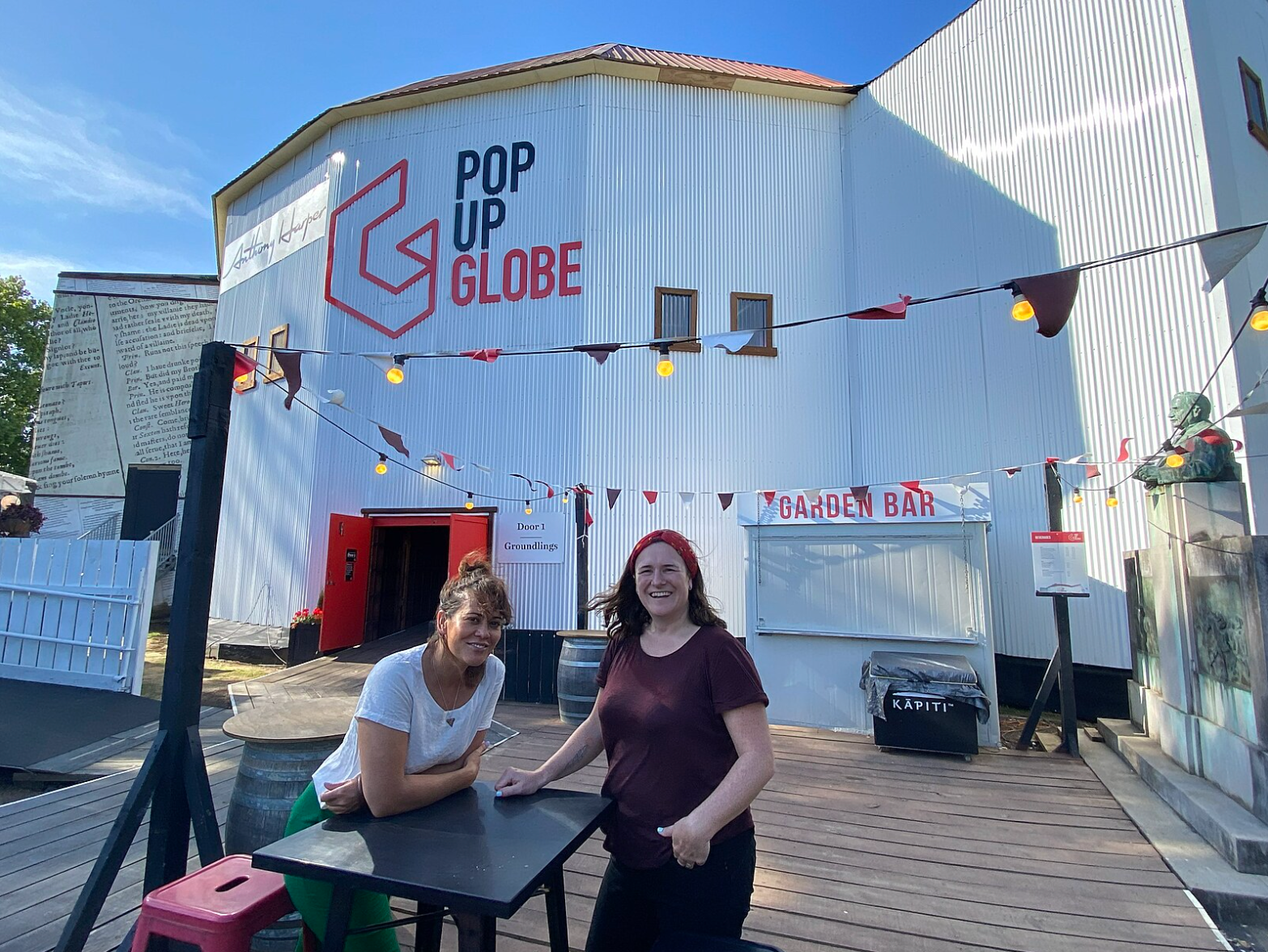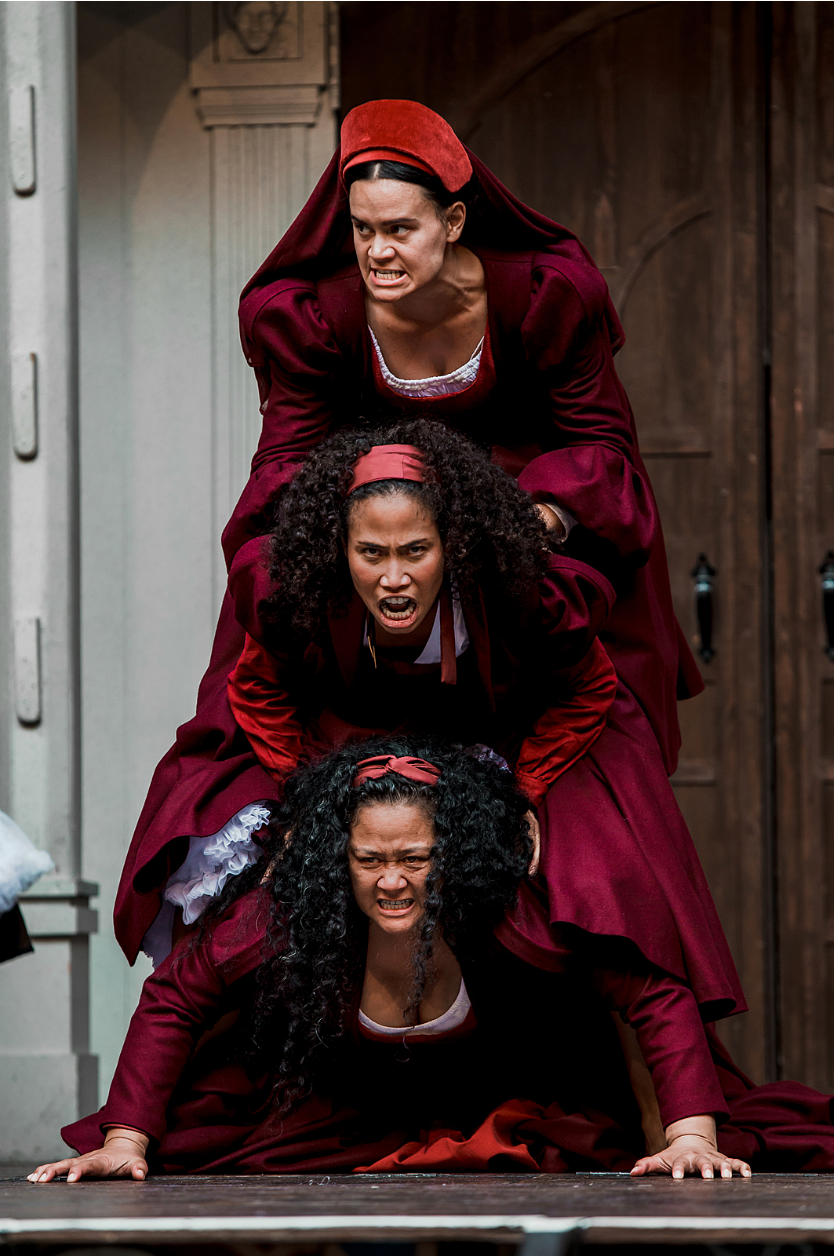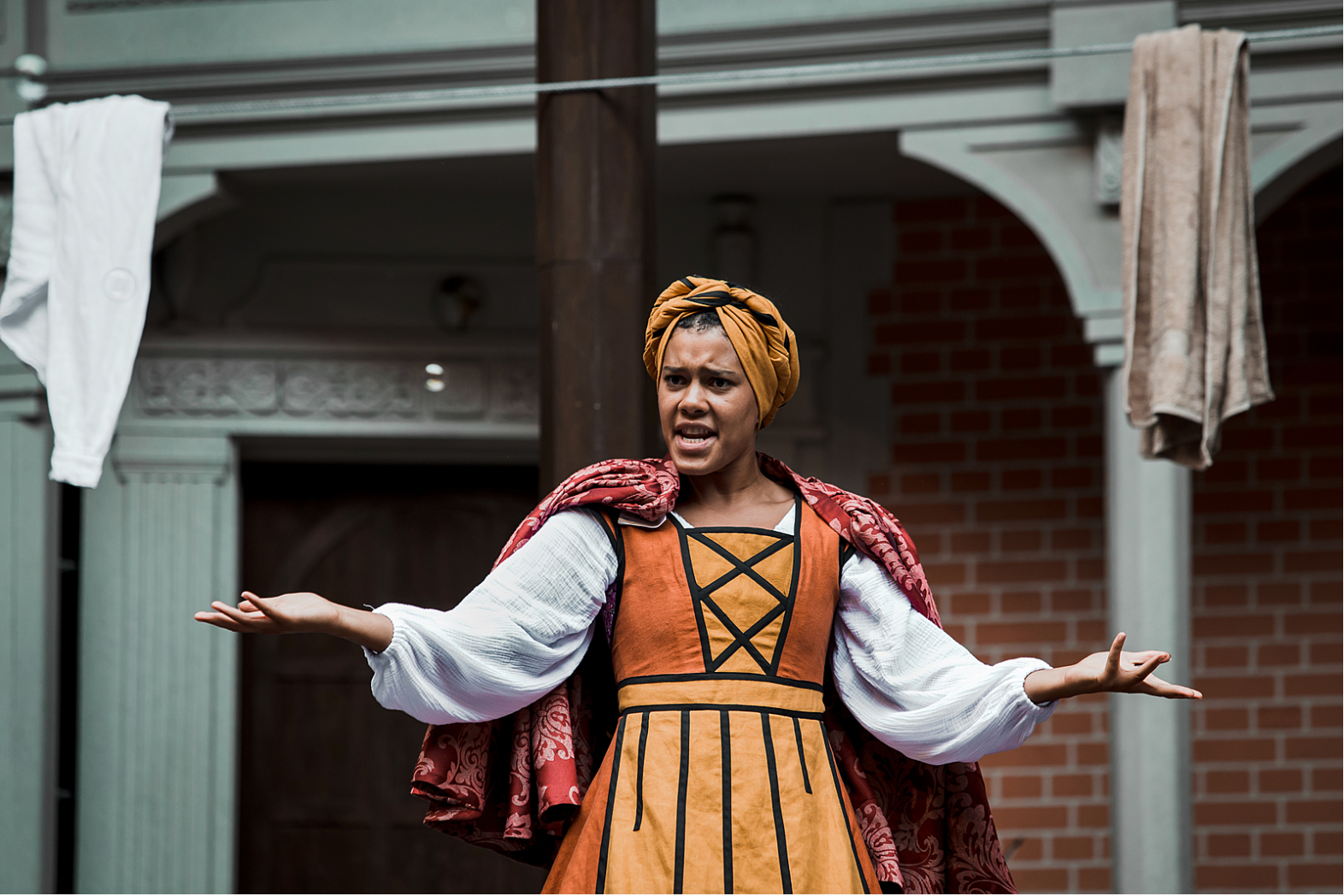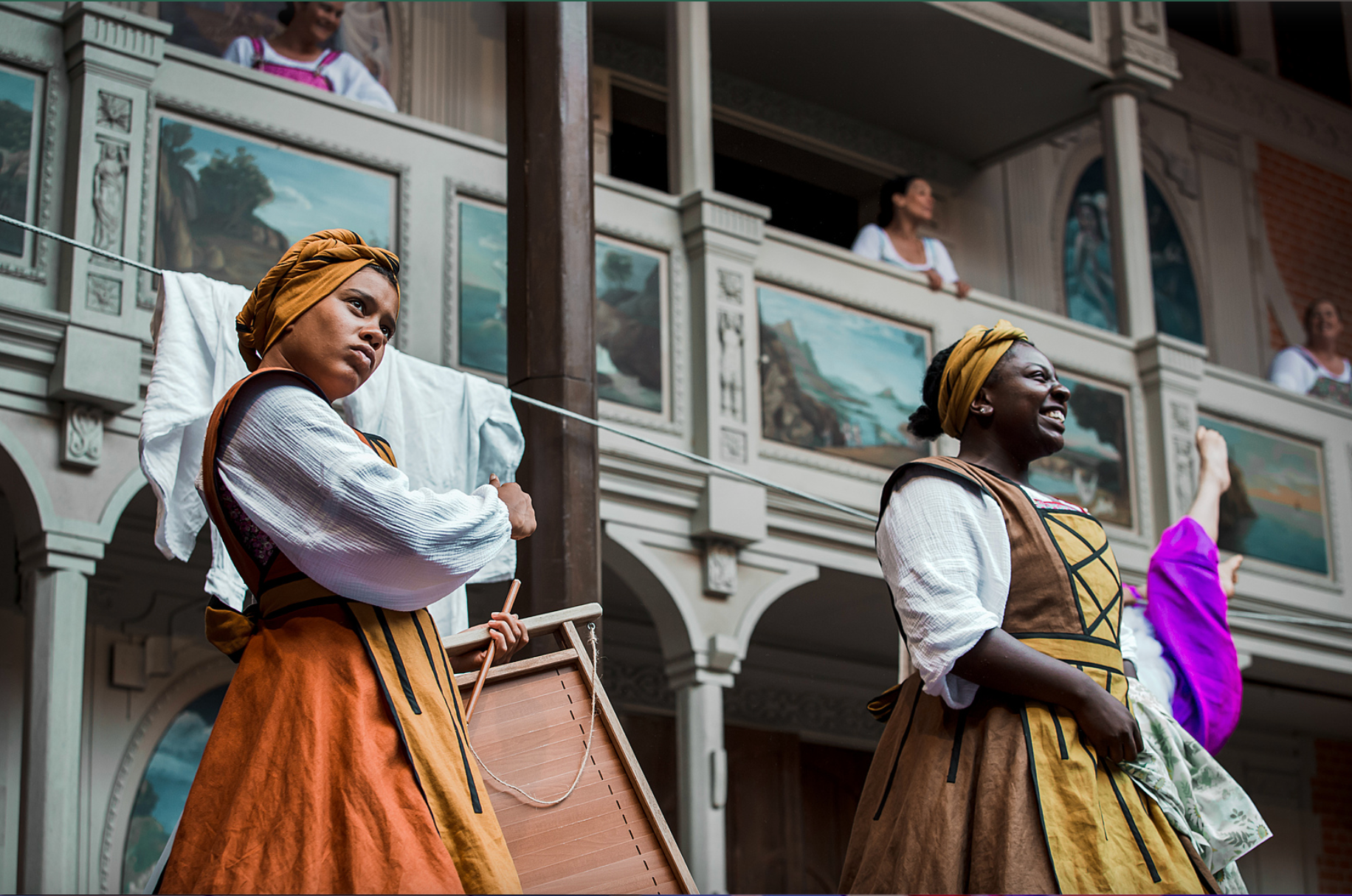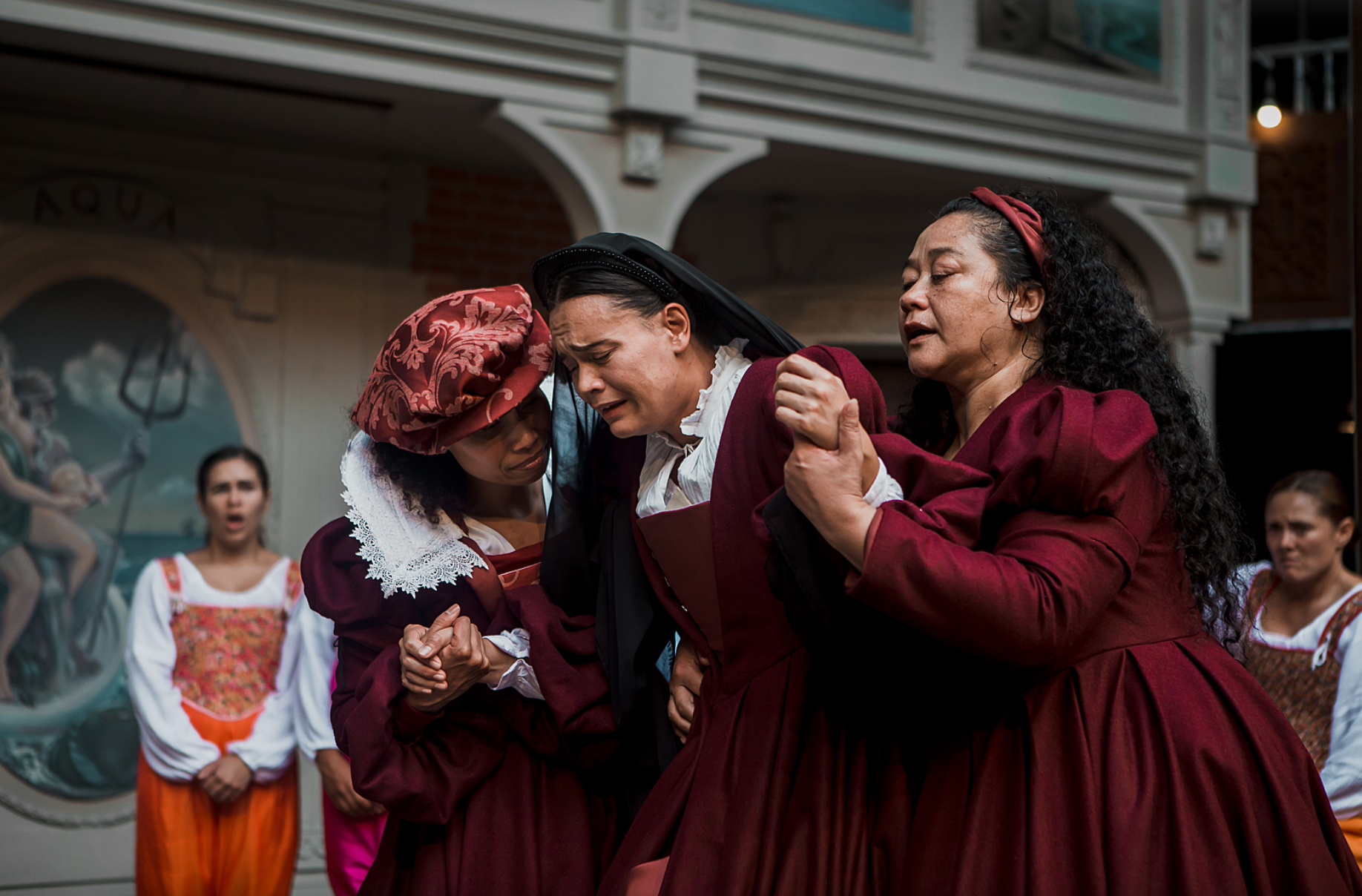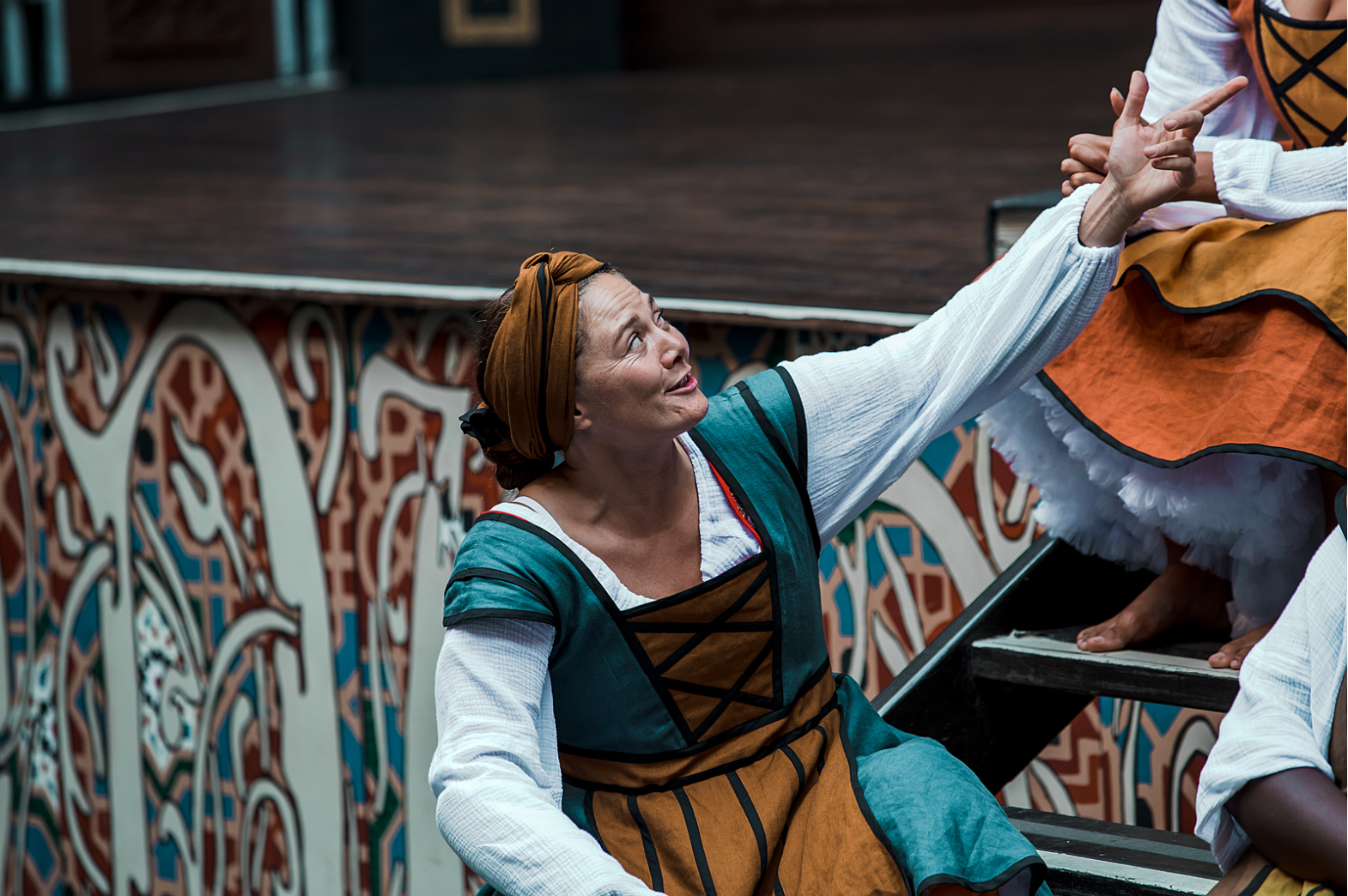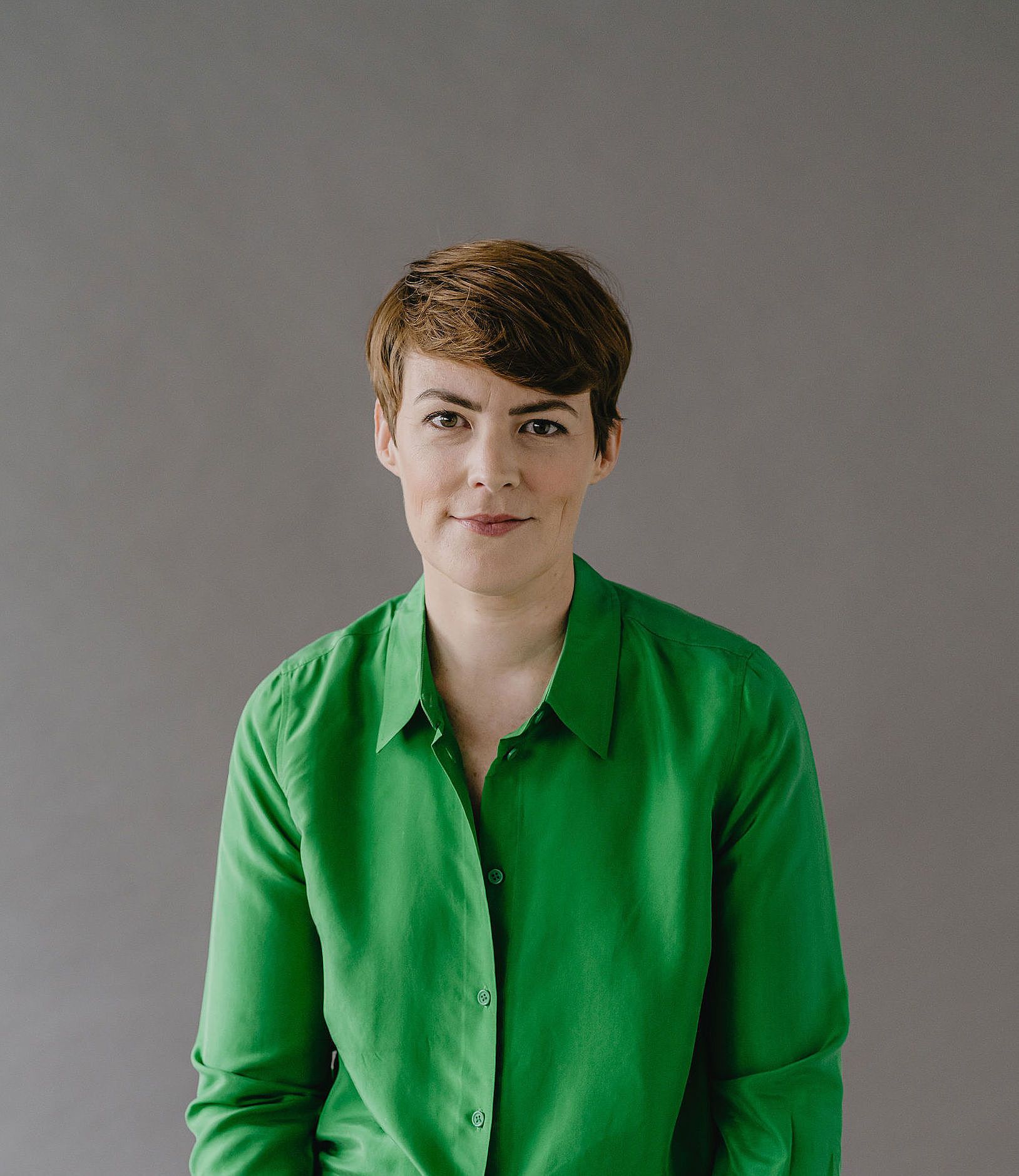Burn The Whole Fucking House Down: Morgan Lloyd Malcolm in Conversation
English playwright Morgan Lloyd Malcolm is in Tāmaki to catch the international premiere of her play Emilia at the Pop-up Globe. She chats with director Miriama McDowell and Kate Prior.
English playwright Morgan Lloyd Malcolm is in Tāmaki to catch the international premiere of her play Emilia at the Pop-up Globe. She chats with director Miriama McDowell and Kate Prior.
Morgan Lloyd Malcolm’s barnstorming feminist comedy-slash-polemic Emilia opened last Thursday at Pop-up Globe in the theatre’s final ever Tāmaki season. The play was originally produced by Shakespeare’s Globe, London, in a brief yet hugely popular summer season in 2018, and subsequently transferred to the West End in March 2019. Last week the London production – which, like the one in Aotearoa, had an all-women cast and crew – was nominated for three Olivier Awards. Securing the rights to Emilia is an impressive final coup for Pop-up Globe – it’s fairly unheard of to have a successful play that’s so fresh off the UK circuit seeing its first international premiere in Aotearoa, and what’s better is it’s a play that demands the casting of women from diverse backgrounds, wherever it’s staged. On opening night, the playwright Morgan Lloyd Malcolm was in the audience.
I’d been tracking the success of Emilia since the first Shakespeare’s Globe season, and had been intrigued by the conversations it had sparked, so I jumped at the chance to get Morgan and director Miriama McDowell together after opening night to talk about silent histories, the play as an invitation, and feminism on a symbolically patriarchal stage.
Kate Prior: It’s such a gift you’re here in Aotearoa, Morgan, and as soon as I heard you were here I just really wanted to eavesdrop on a conversation between you and Miriama.
Morgan Lloyd Malcolm: And we’ve not really had much of a chance to chat!
Miriama McDowell: Not enough! Although I felt like in the first half hour of meeting I was like, “Oh, she’s one of my kind of people.”
MLM: Yeah, we’re going to be friends.
MM: It’s been quite amazing. I actually wrote Morgan an email in the days before she came, and I thought I’d feel intimidated that you were coming, but I didn’t feel that at all. I felt like, wow, I get to collaborate with this person who’s written this amazing play. It’s been quite fun.
KP: To start, it’d be great if you could speak a little about how Emilia came about.
MLM: So Michelle Terry was just about to take over as the artistic director of Shakespeare’s Globe, and she invited me in to have a cup of tea. I’d gone in prepared to pitch some tiny little show that I could do in a cupboard, somewhere, in the Globe, but she was like, “I need a play about this woman, because I’m going to hang my first season around this, the idea of this potential Dark Lady of the sonnets.” And because Michelle is an amazing scholar of Shakespeare and she’s an incredible performer of Shakespeare herself, she would spot Emilia popping up in different plays – whether she was called Emilia, like in Othello, or she was like Kate in The Taming of the Shrew, who felt like Emilia. She knew that she wanted to programme a bunch of Shakespeare’s plays where Emilia popped up, but in the middle of that season she wanted a play that centered Emilia.
MM: It’s a great idea.
MLM: Yeah, it’s a really lovely idea. And she said, “Go and have a read about what you can find out, and see whether you want to do this piece.” And so I did. And I just really connected with it straight away, just because she was a writer. At that point I’d been 16 years working as, or trying to work as, a playwright. And I was at the edge of starting to give up on theatre actually, because I had a few plays that were just stuck in development and nobody was wanting to produce anything. And I was feeling really like, “What’s the point, I’ll go into television and at least I’ll make some money.” So I just really connected with that – Emilia being a woman who simply wasn’t allowed to write in the same way that Shakespeare did. And from what little we know about her, she was so clearly around him at the time that he was prospering and becoming well known and then going on to become so famous and revered. But there’s not enough history there for us to base anything really on fact, there’s only a few little bits that we know. So this is just our own version.
KP: So it needed to be a kind of historical fiction purely because you didn’t have the material?
MLM: Yeah, but that’s why we call it a memory play rather than a history play, because we feel like we remember her even though there’s not a lot to go on. It’s that muscle-memory thing – there are certain things, when we were doing the research, that we could understand. So we do know that she visited [Elizabethan astrologer] Simon Foreman – his is the first book that I picked up when I was researching her. And the way that she’s described by him, it’s like, she's a whore. She’s a devil. Essentially, “She wouldn’t let me sleep with her.” And I’m really paraphrasing, but he would say, “She’d let me touch her all over, but she wouldn’t let me fuck.” So she wouldn’t let him, and she would stay very still, and then she’d leave. It was like, as a woman reading that, I’m going, well, she’s in fight or flight, she’s going, “Right. I’ll just let him do the bare minimum and then I can get the fuck out of here.” And me and Nicole Charles, who directed the original production, we were reading that, going, “Shit. That’s what’s happening.” Not what some male historians assumed, which was that this was all her just being a bit of a slut. Being a bit of a tease.
MM: It’s the Weinstein reaction, isn’t it.
MLM: Yeah, exactly. And so I think that our version of her is a woman’s interpretation of her, with what little we know.
KP: And interestingly, at the time you were writing Emilia, #MeToo was kicking off.
MLM: I started researching in November 2017, and that’s when it was all going down. It was all in the air as we kept working on it, and the layers of relevance grew. It started out just as something very relevant to me like, “Oh, it’s a writer who has nobody who wants to make her work – that’s me.” And then it became, “Oh, no, it’s bigger than that.” It became about, “What is her heritage?” We don’t really know, but we were like, wouldn’t it be interesting, if we created a historical play, but it was a universal play about voice and all these other things. But if we cast it all entirely women, and also it was women of colour in those roles? So it became about the layers of casting and layers of crewing as well, how you crew it. We had all women in our creative team and crew. So yeah, suddenly there were different things we could do with this play, and that’s why it’s really hard to categorise, because for what it can do, it’s not just a play, it’s about what it can do with an industry. That’s what I said to you Miriama: do what you need to do with it to challenge your industry, in whatever way.
Do what you need to do with it to challenge your industry, in whatever way.
KP: That’s what it feels like. It feels like a real invitation to any person who’s working on it.
MLM: It is, yeah.
MM: It really is. It’s really mobilising. And actually, for me, it’s just the first page in the script. When Morgan says, “When you cast it, be bold.” Just to have a writer say that directly to you. For me that was like, “Wow, you're giving me permission to break some walls down wherever I want to.” Which is just so exciting to have that from the start. You write about that ensemble too – you say it’s not a vehicle for one actress, it’s an ensemble play. So yeah, boldness and ensemble, for me, were the two things that let me develop it. And I cast it as an ensemble before I cast the individual roles.
KP: And the New Zealand cast of course has Māori actors and Pasifika actors in it and, compared to Shakespeare’s Globe, putting it in a New Zealand context is a very different offer. Because it’s also speaking into a colonised country, and so it’s got that whole other conversation that it’s kind of opening up.
MM: I’m curious about that Morgan – what that’s like for immigrant Black actresses, in the play. What did they bring to that conversation?
MLM: It was a lot of conversation and it’s that thing that we talk about in terms of ‘otherness’ – that’s such a big topic in the UK. Because we’re an island of immigrants – we’re all immigrants. And it’s one of those weird quirks of the country, where this idea of Englishness, or Britishness, is so, so false. Because none of us are indigenous to that country. It’s really weird. So I think, for the women, the conversations were about their experiences of living in a racist country. Britain’s incredibly racist, and being able to say the words that we say up on the stage in front of big audiences, it just felt really important to all of us, to be able to say that. And also just the offer of putting all these female bodies for a start, but also female women of colour, on that very male stage. Even the space of the Globe is male – it’s very boxy. We had to kind of feminise the space. We used a lot of circles. It was like a hug.
Art or entertainment as direct or indirect critique. Does it work?
KP: It’s interesting, that conversation about space, because the play is made for and performed in these spaces that are concerned with the history of the Western canon and therefore have a kind of patriarchal legacy. And the Pop-up Globe isn’t without its tensions around all-male casts, and using #MeToo as a publicity campaign in that context. And Shakespeare’s Globe isn’t without its own issues as well, with what happened with [former Artistic Director] Emma Rice having to quit pretty acrimoniously. And so I guess it’s a question I have. What is the power of doing work like this in those spaces? Art or entertainment as direct or indirect critique. Does it work?
MLM: What do you think, Miriama, with putting the play on here [at Pop-up Globe]?
MM: Does it work? I can talk to one of the things that I love most about our production, and it’s when we decided to vandalise the space. That's what we call it. And so we all chose posters of women of colour, actually anyone who was important to us, to cover up the portraits of white men through the whole space. It started on one of the first days, when we went in, and [Pop-up Globe Artistic Director] Miles Gregory taught a class on direct address that was great. And one of the actors, Saraid, put up her hand and said, “Tell me about the pictures. Who are these people?” He’s like, “Oh you know, the patrons, and writers, directors, actors from the time.” “Oh yeah. Can we take them down?” And he was like, “Sorry, what?” “We want to take them down. Can we take them down?” “Why would you want to do that?” “I don’t want to see these white men looking at me when I say this play, when I carry this play into the space.” “Well think of it as a dialogue.” “I’d rather have a dialogue with my people than have a dialogue with those people.” And it was clear that when I formed a more comprehensive plan around that, he was really open.
KP: When it’s a clear dramaturgical offer.
MM: Yeah. But yeah, that space forces you, and that history forces you, to challenge it. Because if you don’t, then there’s just a veneer of what you’re trying to say. It’s just like a tiny top layer. If you still perform that play to all of those white men.
KP: And the invitation of this play, it’s like you’re not meeting the invitation of the play…
MLM: … if you’re not challenging those things. Yeah that’s absolutely right.
MM: And that was very empowering for me, because I was able to keep saying, in every production meeting here, “You chose to do this play. This is what you invite. This is what you’re inviting.” Because I didn’t come to the Pop-up Globe and say, “Can I do this play?” They wanted to do it. And I think it was a big process too.
MLM: It was a big deal. And you’re right, when you’ve got it, you’ve got to do it properly. So, in a slightly controlling way – but I think I have to – before anybody can license it, they have to speak to me, so that I can make sure they understand what the play needs to do, and that casting-wise, they need to do what you’ve done. So I usually ask them questions about how they cast disabled performers, for example. And whether or not they have any relationships with disabled performance. And if they don’t, to start those conversations now, so that that doesn't just get pushed to one side.
You chose to do this play. This is what you invite.
KP: What do you think of that question, Morgan? Artists sitting inside the institution, critiquing the tradition that institution symbolises?
MLM: Yeah I think that’s our power as artists, isn’t it? When you sit down and say, “What is my power as a writer?” Okay, I can write plays for all women. I can write plays where I’m strong about my casting choices and say that it needs to be that way, that’s within my power, I think. It’s a huge question that I’ve been asking myself with my art: How do you change a structure when you’re within it? And how do you actually shift things when you depend on it at the same time? As artists it's a really tricky one for us to deal with because we need to pay our rent. So we’re having to accept money and commissions from the structures that we’re also pushing against and trying to change. I think we’ve got to just keep making work that does move the conversation on. It’s a really hard one because we genuinely need to burn everything down. But then you go, “Well then what?” You know, what do we do with the ashes of our existence? And that’s the big question. And I don’t have an answer for that. I just think we have to keep making art, and asking questions, and challenging people to do things differently.
MM: And it’s also to do with uplifting, isn’t it? I’ve found that since I’ve transitioned from being an actor into being a director, that other women directors are so amazing about being open and offering, teaching, mentoring. And that’s how we take the power too – to keep putting the skills out. Working together.
KP: Do you think if you were writing this play in a different time, not during #MeToo, it would have been as angry?
MLM: No, I think it is very much a product of the time I was writing in, and I think a combination of my own anger about my career but at the same time the anger about what was happening in #MeToo. I felt like there were women being really brave and speaking out and saying things that were terrifying, and we needed to be just as brave. And I think it’s really hard to be angry in public because we're not supposed to be, but I think once we did the first preview, we were like, “Okay, people want to hear this. They’re just as angry as we are, so that’s fine.”
MM: I really realised in the last week leading up to opening that the whole play is a bed for the last speech. It’s just laying the foundations so that we’re able to get to – and I love these words – “What can I say to you?” And Emilia chooses to talk about anger. It’s really beautiful. But it’s like, we have to lay it all down before we can actually say it. I feel like that's your voice more than anything, Morgan, that's when we really see you or hear you.
MLM: Yeah, and you do need to see all of that before you get there. And I didn’t write that speech until about draft four. And then I got to the point when I'd written enough, and exactly what you say – I was ready to write that speech, and it literally hasn’t changed since then. Apart from the “fucking” in “burn the whole fucking house down.” There used to be no “fucking”, and then Clare Perkins came in for her audition – the one and only audition she did and she nailed it – she's like, “Do you know what? I think it needs to be, ‘Burn the whole fucking house down.’” I was like, “Yes, it does, Clare. Yes, it does.”
KP: I was just looking at the speech and I was wondering about that! Because it’s such a well-deployed “fucking”.
MLM: That was Clare Perkins. I can’t claim that one, that was her.
KP: In the play there’s a destructive energy and there’s also an affirmative energy, and the play holds both those things. Like with the group of washerwomen, Emilia finds her women. Was it always important to you to have that energy in there?
MLM: Yeah, and the group, the need for the support of your women, I think. That’s what she doesn’t have at the start and she comes to find it, and it becomes really important and I think so many of us have gone through situations where, actually, it’s been the women around us that have pulled us up and out of it, and supported us and looked after us. I also wanted to honour that in the play and we’ve got to keep doing that for each other. That’s the thing – we’ve often been pitted against each other so much that we’ve been made to feel like other women are the enemy, but actually we’re not. We're there to look after each other and support each other and raise each other up.
But real talk, it’s really hard to work with a cast of women.
MM: Yeah. But real talk, it’s really hard to work with a cast of women.
KP: Is it?
MM: It is. It’s really hard.
MLM: Yes, you’re right.
MM: And I think part of it, because I’ve got an eight-year-old girl, and I sort of watch that thing of young girls trying to figure out where they sit in a group and they may not have the size or the punch, so they have to figure it out in other ways, and I find that with adult women too. We have to really work hard to not need to have some kind of hierarchy. Even though women shouldn’t need hierarchy, I feel like a lot of my work in the rehearsal was actually talking about how women need to work together, which is sad but also just what it is.
MLM: There’s a conditioning, though, isn’t there, that we’ve sort of been told that our whole lives, that we do need to compete and we do need somebody in charge. It’s a hard one to go against. In our production we had the same struggle.
KP: Did you?
MLM: Yeah. You’re in a room with some powerful women. That’s what you cast in this play and the play’s about giving everyone a voice, and you give everyone a voice, and it kicks off.
MM: It does.
MLM: That’s great, it’s amazing, but it also slows things down when you’re just trying to stage a show that’s a big show – it’s a big beast of a show. You’ve got music and dancing and comedy moments, and it’s hard because you just need to get through it and it’s really hard to go, “Right, yeah, I hear you but we just need to get on with the next scene… ”
MM: That’s amazing you say that because we had to come up with agreed language that we would use, that I could use – exactly that. “I hear you, I hear this is important to you, but I need to work.” Or else we’d just talk.
KP: That’s amazing. It brings up so much stuff.
MM: Yeah and if you ignore it then you’re not honouring the piece, so you can’t ignore it, but at about the end of week two, I had to just sit everyone down and go, “How are we going to make this play? Because if we keep talking, we won’t make it and I really want to make it.”
MLM: Good for you.
MM: I had to write a contract about how we would work together [in a way] that fed the work, that honoured our voices but fed into the work instead of away from work. And I resented that. I resented that I had to take time out of rehearsals to talk to women about how women should work together and I went, “Fuck no, I’m not going to do it. They can sort it out.” And in the end, I went, “No, this is the breath, this is the essence of the work.”
KP: And do you think it’s women, though, or do you think it’s the nature of the play, and it’s like a geyser?
MM: It is women, because women aren’t used to being given space to say how they feel or what their experience is, and so when you finally do, yeah, it’s a geyser.
There’s so much learning for me. Just really working through my own resentment and anger, you know?
MLM: We were the same. And there was just no time for these conversations.
MM: There’s so much learning for me, so much. And just really working through my own resentment and anger, you know?
MLM: We all bring it to the table, and also when under pressure it’s amazing how those come out in different people. I remember Nicole saying, “I don't know how to manage this situation because they all have such different demands on me and it’s really hard.”
MM: And it’s nothing to do with age or ethnicity or anything. It really is like everyone needs something.
MLM: Because it brings up so many things.
MM: Interesting, eh?
MLM: Yeah.
MM: And, next, I’m directing a play with two actors and a musician.
MLM: Easy. It’s going to feel so easy.
MLM: I remember, after our season, I did a workshop on a little play of mine, which has three women in it and it was me, the three women, a director, in a room and I was like, “Oh, this feels delicious because this is it, this is just us. This is just us in a room.” Because Emilia is a big show.
MM: It’s amazing.
MLM: It’s a whole beast.
MM: It’s an amazing beast.
Emilia runs from 4 – 22 March at Pop-up Globe. Tickets available here.
Editorial note: This article was amended on 13 March. In an earlier version Miriama McDowell incorrectly quoted Miles Gregory. This has been amended to “Why would you want to do that?”
